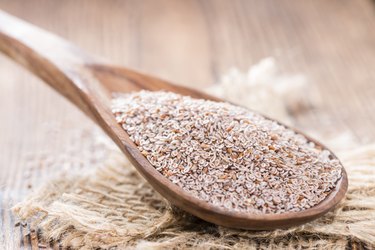
Psyllium husk is native to Iran and India, and traditional medicine typically uses the seeds of the plant. In the West, most people use supplements made from the husk, a rich source of soluble fiber that can ease constipation and lower cholesterol. Fiber supplements do not have any significant risks associated with them, but like many supplements, adverse reactions are always a possibility. Before using psyllium husk, talk to your doctor about the proper dose and other aspects of safe use.
General Dose
Video of the Day
The exact dose depends on your reason for using psyllium. The University of Pittsburgh Medical Center reports a typical adult dose of 3 g to 6 g two to three times a day, but some conditions might require higher doses. Children can take half of the suggested dose, which totals 9 g daily. Always check with your pediatrician before giving your child any type of nutritional supplement.
Video of the Day
Dose for High Cholesterol
An analysis of eight studies examining the effects of psyllium husk on cholesterol, published in the February 2000 issue of "The American Journal of Clinical Nutrition," found a dose of 10.2 g daily lowered LDL, or bad cholesterol, by 7 percent when combined with a low-fat diet.
Another meta-analysis of 21 studies, published in the July 2009 issue of the "European Journal of Clinical Nutrition," found doses between 3 g and 20.4 g lowered cholesterol. The effect was in direct proportion to the dose used.
If you want to take psyllium to treat high cholesterol, talk to your doctor about the appropriate dose.
Doses for Other Conditions
The University of Michigan Health System reports that research and doctors use the following daily doses: constipation, 5 g one to two times a day; diverticular disease, 7 g; irritable bowel syndrome, 3.25 g three times a day; diabetes, 5.1 g three times a day with meals; diarrhea, 9 g to 30 g; hemorrhoids, 7 g three times a day; high triglycerides, 15 g.
Considerations for Use
Drink at least 8 oz. of water with each dose and plenty of liquids during the course of the day to prevent constipation. If your fiber intake has been low up until now, start off with smaller amounts to allow your body to adjust and to reduce side effects like gas and bloating.
Take psyllium supplements a minimum of one hour before you take medications or other supplements or at least two to four hours afterward to prevent reduced absorption. Psyllium might specifically interact with tricyclic antidepressants, carbamazepine, cholesterol drugs, digoxin, lithium and diabetes drugs, according to the University of Maryland Medical Center. Do not use psyllium without talking to your doctor first if you take these medications.
Avoid psyllium if you have intestinal blockages, trouble swallowing, unexplained abdominal pain or rectal bleeding.
- ''The American Journal of Clinical Nutrition''; Cholesterol-Lowering Effects of Psyllium Intake Adjunctive to Diet Therapy in Men and Women with Hypecholesterolemia: Meta-Analysis of 8 Controlled Trials; J.W. Anderson, et al.; February 2000
- University of Michigan Health System: Psyllium
- University of Pittsburgh Medical Center: Psyllium
- University of Maryland Medical Center: Psyllium
- ''European Journal of Clinical Nutrition''; Time- and Dose-Dependent Effect of Psyllium on Serum Lipids in Mild-to-Moderate Hypercholesterolemia: A Meta-Analysis of Controlled Clinical Trials; Z.H. Wei, et al.; July 2009